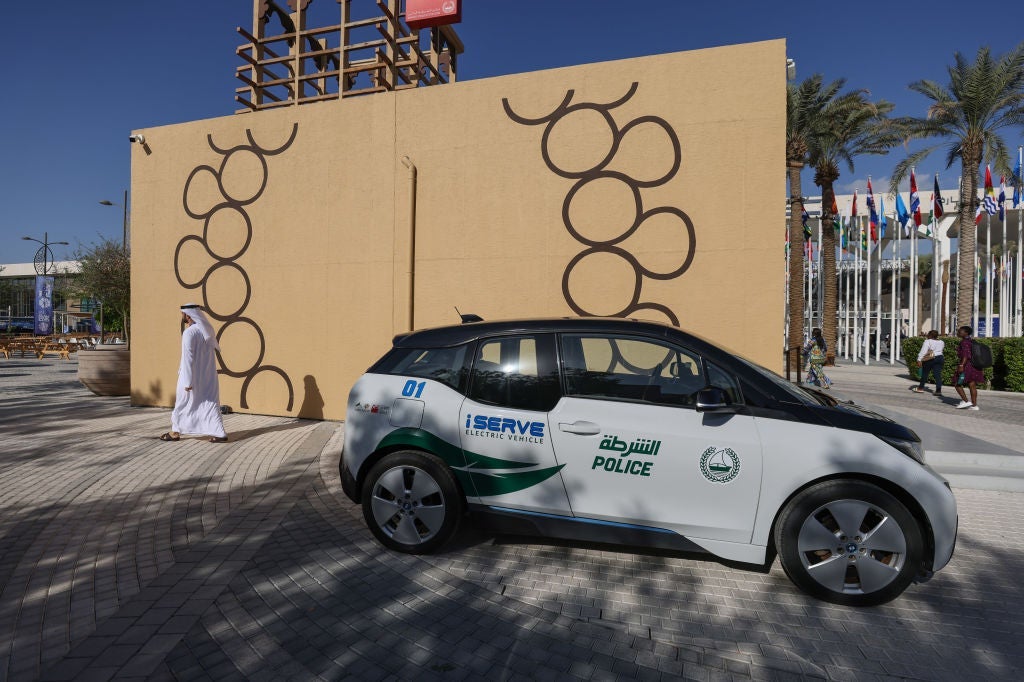
DUBAI – Suspense over whether a “phase out of fossil fuels” will appear in the final COP28 cover text is palpable at Expo City Dubai, the site of this year’s annual climate conference. The cover text will be its primary outcome and drive global climate policy over the next year. The best parties have ever managed is a “phase-down of unabated coal”. In contrast, a fossil fuel “phase-out” would align the global community with what climate models suggest is needed to limit global warming to 1.5°C.
Regardless of current dithering at COP28, the reality is that market forces are driving the world towards peak fossil fuels. The International Energy Agency (IEA) now anticipates peak coal, oil and gas “before 2030”, according to its latest World Energy Outlook. A November report from the Berlin-based non-profit Climate Analytics – authored by some of the world’s leading climate scientists – is even more optimistic, anticipating peak coal demand in 2023, peak gas in 2024 and peak oil in 2025.

Access deeper industry intelligence
Experience unmatched clarity with a single platform that combines unique data, AI, and human expertise.
Coal and gas are heading towards peak demand due to the transformation of electricity and heating systems, which is driven by the massive growth in solar and wind, as well as heat pumps. Oil – long the most valuable commodity market in the world – is expected to decline largely because of booming electric vehicle (EV) sales worldwide.
Transportation is responsible for around 60% of world oil demand, while road transport alone accounts for a massive 15% of global energy-related emissions. EVs are now widely seen as the key means of decarbonising this sector.
EV sales have boomed over the past few years, with the IEA anticipating 18% EV sales in the global car market in 2023. The growth in EVs means that the IEA now expects EVs to erase five million barrels per day of world oil demand by 2030.

US Tariffs are shifting - will you react or anticipate?
Don’t let policy changes catch you off guard. Stay proactive with real-time data and expert analysis.
By GlobalDataAhead of COP28, EVs were one of just three sectors – along with solar power and lighting – that the IEA assessed to be “on track” for net zero by mid-century. Energy Monitor's parent company, GlobalData, expects global EV sales to hit 51.6 million in 2035.
Sales of EVs in China have soared in recent years, representing around a quarter of the market. In the US, the Inflation Reduction Act has attracted $100bn in new investment announcements in EV and battery manufacturing, as well as in battery components and recycling.
However, unlike solar PV – whose cheapness and distributed nature make it an attractive investment prospect the world over – EVs have made little impact in emerging markets and developing economies due to the relatively high purchase price of an EV and a lack of available charging infrastructure.
This has not gone unnoticed by some of the world’s national climate leaders, who have launched a new Global Zero Emission Vehicles (ZEV) Transition Roadmap, as part of the COP28 Breakthrough Agenda. The Breakthrough Agenda is an internationally recognised and annual COP-centred process, launched two years ago at COP26. Backed by 56 countries, its goal is to boost international cooperation on decarbonisation this decade in certain high-emitting sectors including transport.
Among several new collaborative programmes launched by the Breakthrough Agenda at COP28, the ZEV Transition Roadmap presents a holistic framework that articulates how wealthy governments intend to strengthen support for EVs in emerging markets and developing economies, with the ambition of making EVs the “most affordable, accessible, and attractive option in all regions by 2030”.
Led by the Zero Emissions Vehicles Transition Council – which is comprised 17 territories including the UK, US, Canada and South Korea – the road map calls for improved access to and a scaling-up of financing for EVs; accelerated charging infrastructure rollout; lifecycle management of vehicle batteries and components; and further technical support for emerging markets and developing economies.
"Through this roadmap we are setting out for the first time a coordinated plan to support developing countries to transition to zero-emissions vehicles,” said Graham Stuart MP, Minister of State for Energy Security and Net Zero in the UK, in a statement on the road map for EVs at COP28 on 5 December.
“This is vital if we are to keep 1.5°C within reach but also essential for improving air quality, reducing oil consumption and ensuring no country is left behind in the EV transition. Now we need to get on and implement these bold and ambitious plans without delay.”
Keep up with Energy Monitor: Subscribe to our weekly newsletter
Michael S Regan from the US Environmental Protection Agency added: “As co-chair of the Zero Emission Vehicle Transition Council along with our partners in the UK, it is an honour to work together with every ZEVTC member to accelerate the transition to a clean transportation future.
“Moving quickly toward a zero-emission vehicle future will be key to improving air quality, reducing the impacts of climate change and boosting our economies. Today’s action is an important step forward in these efforts and will help ensure those who have historically been left behind benefit equally from the historic climate solutions and opportunities ahead.”







